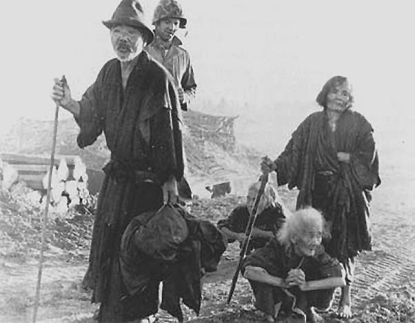
Okinawans flee
their homes during the Battle of Okinawa, an 82-day
battle culminating in June, 1945. Civilian victims of the battle
have
sought compensation from the Japanese government for damages
sustained during the confrontation at the hands of Japanese
forces.
Battle of
Okinawa Victims Deserve Better Treatment from Government (Ryukyu Shimpo Shimbun, Japan)
"Far from
protecting residents, the Japanese Army actually slaughtered them and forced
them out of their shelters. Can we really ask survivors to 'accept and tolerate'
suffering described as the 'nadir of grotesqueness?' ... The plaintiffs have
placed their last hopes in this trial, and as the nation's bastion of human
rights, the Supreme Court should address their claims head on."
EDITORIAL
Translated By Violet Knight
October 29, 2012
Japan -
Ryukyu Shimpo Shimbun -
Original Article (Japanese)
At the first oral proceedings for a trial in which Battle of
Okinawa victims have sued the state for damages, the plaintiffs recounted their
brutal war experiences with great emotion, and demanded an apology and
compensation. In response, the Japanese government called for the case to be
dismissed on the grounds that "there is no obligation to accept or deny the
claims made by the plaintiffs."
The government has chosen not even to listen to the plaintiffs'
claims, who lost relatives or were orphaned. It must be said that it is insincere
for the state sought to dismiss the case based on legal arguments alone.
Many civilians were caught up in the fighting during the
Battle of Okinawa. This lawsuit is the final appeal of the-now elderly people
who have suffered from deep scars all of their lives. To atone for misguided national
policies, the state needs to face the plaintiffs with integrity.
The state has asserted the doctrine of "sovereign
immunity" and the legal precedent of "accept and endure," by
which in times of state of emergency, such as war, citizens should accept
damages suffered. Therefore, the government’s position is that the claims have
no legal basis.
According to the doctrine of sovereign immunity, while the
previous Meiji Constitution
was in place [1890-1947] and before laws were passed to allow for civil suits
against the government, civilian war victims had no standing to demand
compensation for damages caused by state policies.
Even 67 years after the war, Japan continues to overlook civilian
war victims. It's no wonder the government has been criticized for abusing
human rights through neglect. At the same time, members of the military and
civilian personnel have been awarded a total of 52 trillion yen in pensions and
compensation.
Posted by Worldmeets.US
Like
Worldmeets.US on Facebook
SEE ALSO ON THIS:
Okinawa Times, Japan:
Okinawans will 'Spew Magma' Over Crimes of U.S. Forces
Global Times, China:
Continued Dependence on America is Bad for Japan
Ibaraki Shimbun, Japan:
After Osprey Deployment, Japan Government 'Cannot Be Trusted'
Chunichi Shimbun, Japan:
On Okinawa Battle Anniversary, People Feel Abandoned
Ryukyu Shimpo, Japan:
Okinawans ‘Unswervingly’ Against ‘Defective’ Osprey
Tokushima Shimbun, Japan:
Okinawa Deserves Freedom from American Bases
Yomiuri Shimbun, Japan:
Okinawa Governor 'Adament' About Osprey
Asahi Shimbun, Japan:
Opposition to Osprey Deployment Grows
The Okinawa Times, Japan:
It's Time to End Japan's 'Servitude to America'
Nishinippon Shimbun, Japan:
It's Imperative for Japan to Look Outward Again
Nishinippon Shimbun, Japan:
Revise ‘Inequitous’ U.S.-Japan Security Deal
Ryukyu Shimpo Shimbun, Japan:
After Quake, Japan Can Ill Afford U.S. Base Repair
People's Daily, China:
Australia Should Avoid Helping U.S. Hurt China's Interests
Australia:
Aussie Coverage of Obama's Visit to Darwin; His Challenge to China
Isen Shimbun, Japan:
Despite its Mistakes, Japan Needs U.S. More than Ever
YOUR DONATION MAKES OUR WORK AS
A NON-PROFIT POSSIBLE. THANK YOU
It is natural for people to ask whether sovereign immunity
is really why civilian damage is the only aspect of wartime state policy that has
been left ignored.
In the 2004 compensation trial related to sex slavery during
the war, the Niigata District Court rejected sovereign immunity as "contrary
to justice or fairness."
The legal precedent of "accept and endure," which
is based on a Supreme Court ruling in relation to damages inflicted during air
raids, states that "damages resulting from war should be equally accepted
and tolerated."
Is this principle appropriate when applied to the Battle of
Okinawa, in which so many local citizens became embroiled in a land battle? Far
from protecting residents, the Japanese Army actually slaughtered them and
forced them out of their shelters. Can we really ask survivors to "accept
and tolerate" suffering described as the "nadir of grotesqueness?"
The average age of the 40 plaintiffs is 77, with the oldest
aged 91.
The court should examine the details of each war experience
recounted by the plaintiffs and ensure that the hearing proceeds with care and
attention. The plaintiffs have placed their last hopes in this trial, and as
the nation's bastion of human rights, the court should address their claims
head on.